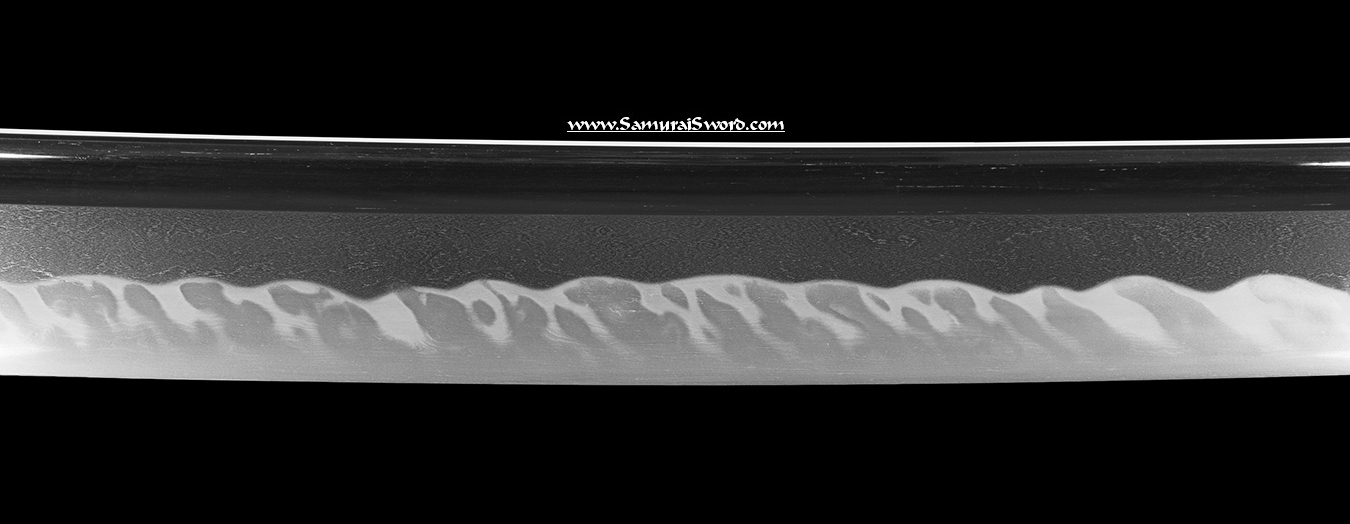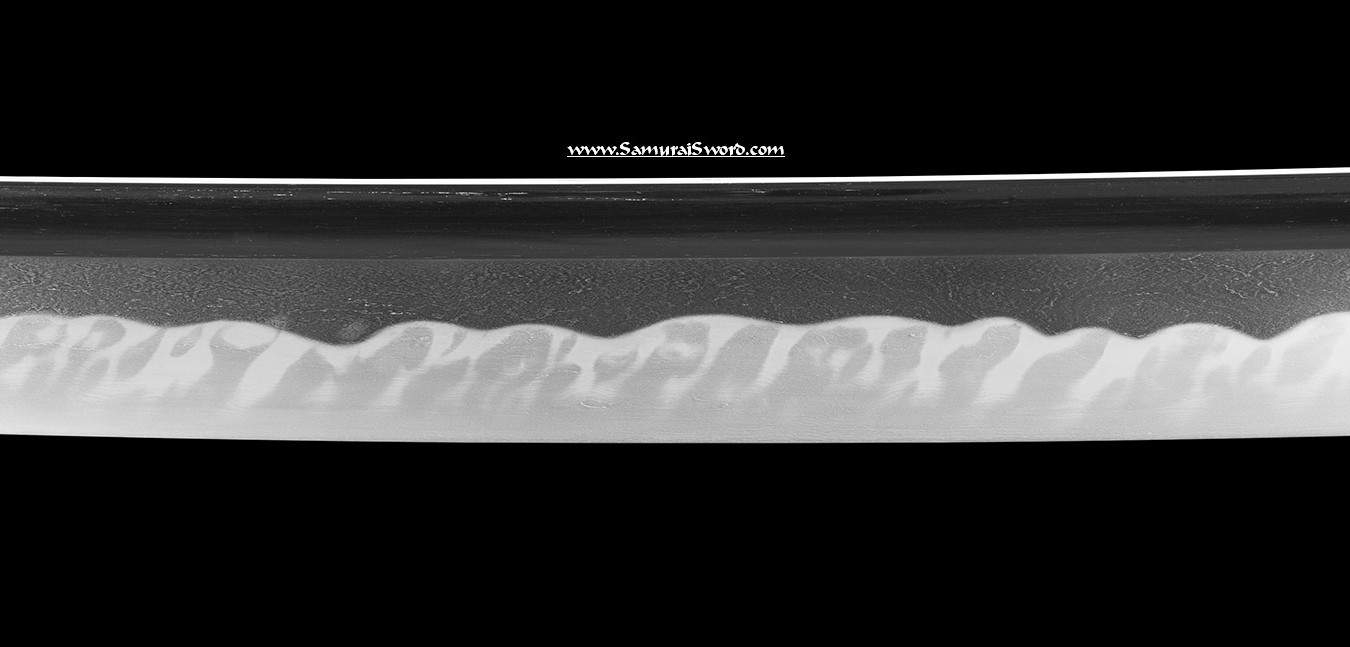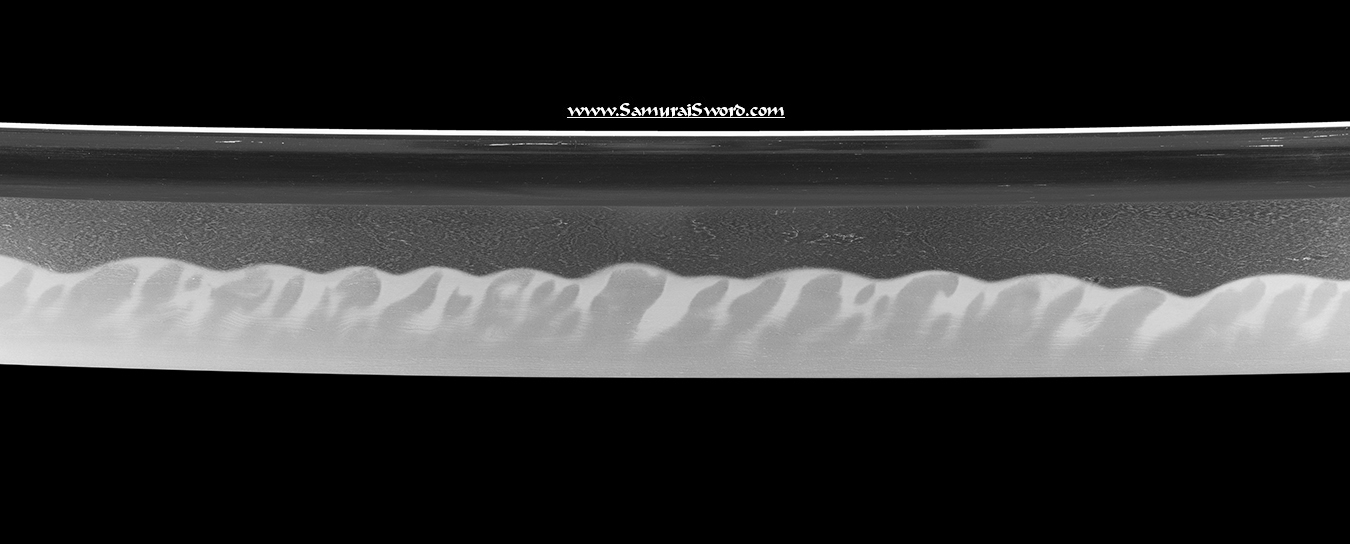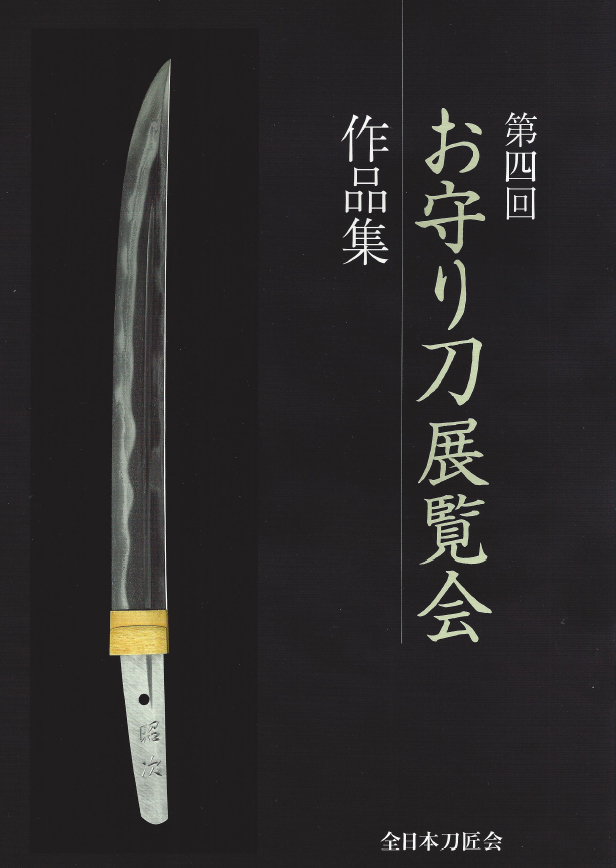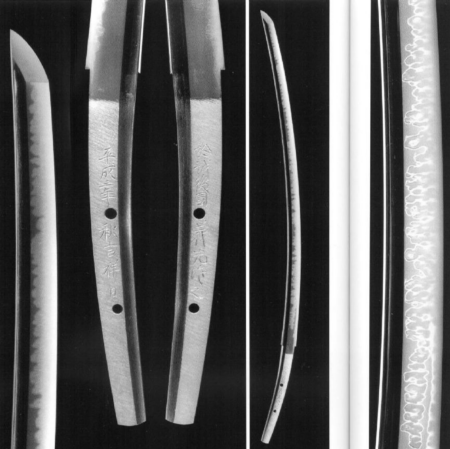Gallery Page (Display Only)
A Fantastic Katana by Ono Yoshimitsu
resemblance to Chu-Aoe School
-W/ his saya-gaki
Rated Mukansa “Without Judgment”
*Mukansa meaning: “without judgment”, meaning that his swords are of such a high level that they are displayed at the annual contemporary sword smith exhibition without examination of a panel of judges; no further awards will be granted, since the swords are above competition.
THIS BLADE BY ONO YOSHIMITSU, WHOM IS RATED MUKANSA IS CONSIDERED TO BE A NATIONAL LIVING TREASURE (AND WILL LIKELY BE MADE SO AFTER HIS DEATH) IS ONE OF THE MOST IMPORTANT AMONGST OTHER LIVING NATIONAL TREASURES.
Classification: Katana
Katana- mei
Measurements: Nagasa (length): 70 cm / 28″; Motohaba (width): 3.5 cm; Sori (curvature): 2.1 cm; Motokasane 7.33 mm; Sakihaba 27 mm; Sakikasane 10.56 mm; Kissaki nagasa 61.6 mm; Overall 90.7 cm; Nakago nagasa 20.7
Fukura- rounded
Kissaki- o-kissaki
Boshi- Midare komi
Hamon: Saka-Choji midare (reminiscent of Chu-Aoe school)
Hada: itame
Tang:
mei, omote: Bizen no Kuni ni oite Yoshimitsu kore o saku (????????)
mei, ura: Heisei nij?ichinen aki (???????, “fall of 2009”)
Mune- mitsu mune
Nakago: Ubu, 1 mekugiana
Nakagojiri- ha agari kurijiri
Yasurime- katte sagari
Habaki- kin-kise niju (gold foil)
Horimono (engraving):
Hi (groove)- bohi with kaki-nagashi (omote / ura)
With Shirasaya (wooden storage-case) with Ono Yoshimitsu sensei’s saya-gaki: ?? ???????? ??????? ??
katana, mei: Bizen no Kuni ni oite Yoshimitsu kore o saku, Heisei nij?chinen aki – Yoshimitsu
katana , signed: “made by Yoshimitsu in Bizen province, fall of 2009” – Yoshimitsu
Exhibition:
Omamorigatana Exhibition – Sword-38
Heisei nij?ichinen aki
Name of exhibitor: ?no Yoshimitsu
Published: Omamorigatana Exhibition catalog– Sword-38 (see catalog scans). A catalog of exhibition is included.
?? ???????? ??????? ??
katana, mei: Bizen no Kuni ni oite Yoshimitsu kore o saku, Heisei nij?chinen aki – Yoshimitsu
katana, signed: “made by Yoshimitsu in Bizen province, fall of 2009” – Yoshimitsu
Exhibit catalog
Omamorigatana Exhibition – Sword-38
Heisei nij?ichinen aki
Name of exhibitor: ?no Yoshimitsu
Published: Omamorigatana Exhibition catalog– Sword-38 (see catalog scans). A catalog of exhibition is included.
Ono Yoshimitsu’s favorite sword is the national treasure / Meibutsu Yamatorige, and his goal is emulating this style of complex Chôji and elegant Sugata. However, he also works in other styles, but always tries to capture the spirit of a famous sword rather than making an outright copy. His swords are mostly Nioi-deki with Ko-nie, Ashi and Yô, and he frequently produces Utsuri.
Ôno Yoshimitsu ???? Time Line…
Ôno Yoshimitsu (sword smith name) was born October 16, 1948, in Niigata, Japan with the given name of Yoshikawa Mitsuo. He is the third son of Sukasa (father) and Saki (mother) Ono. He took interest in Japanese swords while in school. In 1969 he joined the swordsmith studio of Yoshindo and Shoji Yoshihara. By March 1975 he received his swordsmith’s license from the agency of Cultural Affairs. In the same year he was awarded for excellence (Doryoku Shô) at the 11 th Shinsaku-meitoten (The Annual Exhibition of Modern Swords held at the Japanese Art Sword Museum).
In March of 1976 Yoshimitsu opened his own forge in Kurosaki City, Niigata. The following year he married his wife Yoshikawa Kazue made a home with her in Tokyo.
From the 11 th Shinsaku-meitoten in 1976 to the 15 th in 1980, he won the award for effort every year. The following year (1981) at the Shinsaku-meitoten he received the award for excellence (Yûshû Shô). In 1982 at the 17 th Shinsaku-meitoten he won the Prince Takamatsu award (Takamatsu-no-miya Shô). Yoshimitsu then went on to win the Chairman of the Agency for Cultural Affairs award (Bunkachô Chôkan Shô) in 1983. For the following four years (1984-1987) he went on to win the Prince Takamatsu award (Takamatsu-no-miya Shô) each year.
In 1984 Yoshimitsu received invitation from Japan’s premier shine, Ise Shrine, to make a sacred sword for the shrine’s 61 st shrine reconstruction ceremonies. From his past success at the annual sword exhibition, in 1987 he was promoted to the rank of Mukansa*, and has displayed swords in the Mukansa category every year since. In 1989 Yoshimitsu received yet another invitation from the Ise shrine to make a sacred spear for the ceremonies of the 61 st reconstruction of the shrine.
*. Mukansa meaning: “without judgment”, meaning that his swords are of such a high level that they are displayed at the annual contemporary sword smith exhibition without examination of a panel of judges; no further awards will be granted, since the swords are above competition.
Yoshikawa Mitsuo chose the sword smith name of Yoshimitsu. He did this by using one character from his teacher’s name (?) as customary in Japanese traditional arts. He added Ôno to his signature after the creation of his forge in Ôno at Kurozaski, in 1976.
Yoshimitsu’s favorite sword is the national treasure / *Meibutsu Yamatorige, and his goal is emulating this style of complex Chôji and elegant Sugata. However, he also works in other styles, but always tries to capture the spirit of a famous sword rather than making an outright copy. His swords are mostly Nioi-deki with Ko-nie, Ashi and Yô, and he frequently produces Utsuri
*Yoshimitsu is so enthralled by the Meibutsu Yamatorige (a Japanese national treasure ko
bizen tachi) that he devotes much of his swordsmithing time to recreating it
over and over in a spiritual search for the way in which the blade was
originally produced. It is not an exact copy. He has modified some of the
features to suit his own interpretation, but the essence of the original
strongly remains. Yoshimitsu’s research into swordmaking does not stop there. In
a further effort to recreate the visual appearance of older blades, he has
similarly forged works polished by different schools and by varying standards of
polishers in order to analyze the effects on the finished blades. He conducts
this research at his own expense. Yoshimitsu continues to make swords and pursue
making the Yamatorige at his forge in Niigata and the Hayashibara Museum forge
in Okayama.
~ EXAMPLES FOR COMPARISON TO Ôno Yoshimitsu’s ???? WORK ~
Another Tachi by Ôno Yoshimitsu ????:
Click here (or image) to see larger image of a Ono Yoshimitsu Tachi made in the style of the Ichimonji Yamatorige (almost an Utsushimono [a recreation or copy] of the Yamatorige); Nagasa 79.4 cm, Sori 3.3 cm.
~ END COMPARISON ~
This Sword is not available for purchase.
If you wish to purchase a Japanese Sword please view our Nihonto for sale page or contact us directly via email or contact us at 1(608) 315-0083 any time, please include specifics of what you seek, i.e.: Katana, maker, era, price range etc.
Pictures and content may not be copied without the express permission of samuraisword.com ©








